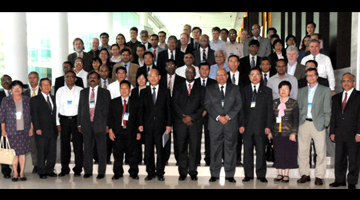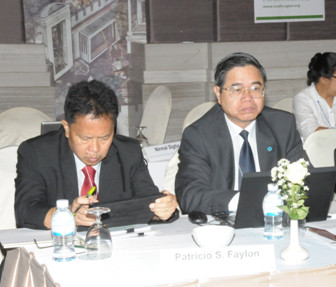 The Philippines is working to sustainably increase productivity and resilience (adaptation), and reduce/remove greenhouse gases (mitigation) while enhancing the achievement of national food security and development goals. Thus shared Philippine Council for Agriculture, Aquatic and Natural Resources Research and Development (PCAARRD) Executive Director Patricio S. Faylon at the international workshop “Climate Smart Agriculture in Asia: R&D Priorities” held in Bangkok, Thailand.
The Philippines is working to sustainably increase productivity and resilience (adaptation), and reduce/remove greenhouse gases (mitigation) while enhancing the achievement of national food security and development goals. Thus shared Philippine Council for Agriculture, Aquatic and Natural Resources Research and Development (PCAARRD) Executive Director Patricio S. Faylon at the international workshop “Climate Smart Agriculture in Asia: R&D Priorities” held in Bangkok, Thailand.
The Asia-Pacific Association of Agricultural Research Institutes, Consultative Group on International Agriculture Research, and World Meteorological Organization organized the international workshop.
From among the projects implemented in the Philippines, Faylon zeroed in on the progress in climatic risk management, adaptation to climate change, and greenhouse gases inventories and mitigation. Notable accomplishments of these projects include development of spatially explicit tool for monitoring and communicating environmental risks in Mt. Makiling, acquisition of bathymetry for coastal erosion management, development of dwarf saba and cardaba banana by irradiation, and remote sensing information for living environments and nationwide tools.
 Dr. Faylon also mentioned recent policies in the country related to climate smart agriculture such as the Climate Change Act, National Framework Strategy on Climate Change, National Climate Change Action Plan 2011─2028, and the Philippine S&T (science and technology) Framework on Climate Change in the agriculture, forestry and natural resources sector.
Dr. Faylon also mentioned recent policies in the country related to climate smart agriculture such as the Climate Change Act, National Framework Strategy on Climate Change, National Climate Change Action Plan 2011─2028, and the Philippine S&T (science and technology) Framework on Climate Change in the agriculture, forestry and natural resources sector.
As Faylon presented the Philippines’ R&D initiatives, he acknowledged the diverse partnerships forged through these projects to strengthen the agriculture sector’s response to climate change. He highlighted the project supported by the Australian Centre for International Agricultural Research, which developed a cost-effective protected cropping system for vegetables.
The workshop served as a venue for knowledge sharing and planning among Asia’s climate specialists, leading agricultural scientists, development workers, and global experts on climate change.
The participants discussed the latest impacts of climate change on agriculture and reviewed the best practices and technologies used to make agriculture climate smart. They also identified gaps and prioritized R&D needed to fill these gaps.
Finally, to ensure sustainability of the agreements and decisions, the group linked knowledge with policy actions at the local/national/regional levels to make agriculture climate smart.
